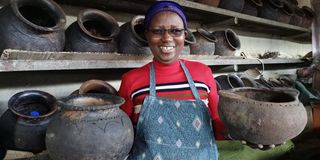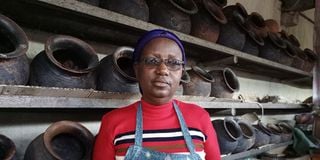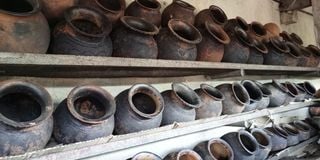How a childhood hobby grew into lucrative business for Nakuru woman

Evelyn Maloba showcases a traditional pot used to cook meat (left ) and that used to cook fish (right) at her shop in Top market on June 10, 2024.
Growing up in the rural areas of Western Kenya, Evelyn Maloba,57, did not know that pots would fetch a lot in the market.
As a young girl at home, she would make pots to be used in their homestead in her free time.
It was not until she moved to Nakuru that she saw the gap in the market and started sourcing pots from Kisumu and reselling them in Nakuru.
“I have been in the pot selling business for ten years now. I invested sh 5,000 in my business as the starting capital. Over the years the business has grown exponentially.

Evelyn Maloba a pot seller at Top market in Nakuru city during an interview on June 10, 2024.
Maloba notes that the market has changed since she started. While Sh 5,000 would buy enough pots to stock the shop, now she needs at least Sh 30,000.
“Pots prices vary depending on size and where they are sourced from. Currently the smallest is going for Sh 450 while the large pots can fetch up to Sh 1,500. Pots produced in Nakuru sell at a relatively lower price,” she explains.
Asked whether the granite pots in the market have affected the demand of traditional pots, Ms Maloba notes that traditional pots charm many.
"They do not corrode as granite pots do. Surprisingly, it is the young generation that are purchasing pots now unlike before," she reveals.
At her shop in Top Market, Ms Maloba explains to Mtaa Wangu that a pot's quality is not just the beauty that meets the eye. However, there are certain ways to identify the best quality of pots.
She advises that one should pick a coin and hit the pot to determine its quality.
"If you get a high pitch sound from the outside, then that’s the pot to buy. However, if the sound comes from inside the pot and with a low pitch, that pot may break easily,” she further explains.
Out of curiosity we ask Ms. Maloba why the pots had different openings at the top.
She throws in a brief laughter and says the different tops explain the type of food to be cooked in the pot.

A display of pots at Evelyn Maloba's shop at her Top market shop on June 10, 2024.
“We have pots meant to cook fish, beef and vegetables, ones for storing water while some are best to prepare ugali,” she says.
Although the business has high returns, Ms .Maloba notes that it’s a high risk business revealing that one can suffer a quick loss if the pots break while on transit .
“We source the pots at fair prices from Kisumu. A pot selling at Sh 1,500 in Nakuru is bought at Sh 500. The journey to Nakuru is what makes this business a high-risk venture because the pots break easily,” she notes.
Further mentioning that, in an order of 20 pots, five may break while on transit.
In return, the cost is extended to the remaining pots to try and minimize the loss, something that may lead to prices fluctuating, not forgetting the impact of the ever changing fuel prices.
Regardless, she says this is a job she takes pride in because it puts food on her table and supports her cereal business which she runs concurrently with the pots business.

